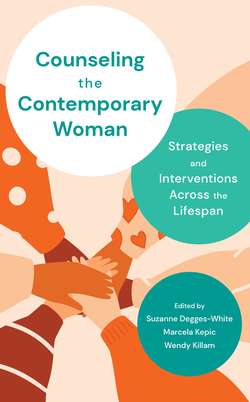Читать книгу Counseling the Contemporary Woman - Suzanne Degges-White - Страница 18
На сайте Литреса книга снята с продажи.
Implications for Counseling and Advocacy
ОглавлениеIntersectionality has been used in a variety of ways, conceptualizing individual experiences (Bowleg, 2013; Purdie-Vaughns & Eibach, 2008) but also large-scale issues such as disparities in public health (Bowleg, 2012). Intersectionality goes beyond simply identifying interactions of oppressive systems and identities; rather, it is designed as a tool to conceptualize complex issues. Clearly, women are differentially affected by systems of social inequality at the individual, group, and community levels. Thus, it is important to recognize how counselors can best intervene in their professional roles. An important addition to the MSJCC is balancing individual counseling interventions and advocacy interventions (Ratts et al., 2016). Counselors are well trained for individual and group counseling; however, training often fails to prepare counselors for advocacy at multiple levels. The ACA Advocacy Competencies (Lewis, Arnold, House, & Toporek, 2003) laid the groundwork for counseling advocacy with and for marginalized groups. Bridging the Multicultural Counseling Competencies (Arredondo et al., 1996; Sue et al., 1992) and the Advocacy Competencies, the MSJCC delineate counseling and advocacy interventions using a socioecological model that addresses intrapersonal, interpersonal, institutional, community, public policy, and international and global affairs (Ratts et al., 2015).
Individual counseling primarily focuses on the unique, individual characteristics of the client; however, an intersectionality perspective takes this a step further by contextualizing these experiences in a socioecological context. Culturally relevant counseling strategies can include the use of empowerment theories that fully integrate cultural perspectives and context. Counseling approaches, including feminist therapy, narrative therapy, and relational cultural therapy (Comstock, 2005; Crethar, Torres Rivera, & Nash, 2008; Jordan, 2010; White & Epston, 1990), intentionally focus on social construction of knowledge and experience, highlighting issues of power, agency, relationships, and the sociopolitical nature of experience. These strategies can be woven into counseling practice with all women, addressing each client’s interactions of privileged and marginalized identities. Counselors should also assist clients in recognizing power structures and controlling images, as these can impact views of self and create psychosocial barriers in mental health treatment (Abrams et al., 2016; Caplan & Whittemore, 2013; Dougherty et al., 2016; Lara-Cinisomo et al., 2018).
Counselors too need to be aware of the multiple, layered cultural factors they identify with and how they are affected. To this, counselors must add an understanding of their clients’ cultural identities and the interactions in the counseling relationship (Ratts et al., 2016; Watts-Jones, 2010). Further, counselors must be able to recognize culturally laden and gender-biased influences in counseling assessment and diagnosis (Katz, 1985; Marecek & Garvey, 2013). Counselors are encouraged to initiate these conversations through broaching behaviors using multicultural and social justice counseling competencies as a foundation (Day-Vines et al., 2007). Counselors can then assist clients in deconstructing internalized oppression, rejecting cultural stereotypes, and developing their own, culturally relevant meaning of womanhood.
There is a long history of advocacy for clients in the mental health professions (Kiselica & Robinson, 2001), but there is also a history of marginalization and discrimination against people of color, women, and other minoritized groups (Jackson, 1995; Marecek & Garvey, 2013; Sue & Sue, 1977). To fully shift the profession, counselors must understand minority stress, the impact of social conditions on wellness, and client access to social and economic resources. Instead of adopting an individual advocacy lens for individual clients in a single setting, there is growing momentum with counselors focusing on larger systemic issues, such as the impact of oppression on mental health and the impact of public policy on mental health access and services (Lewis et al., 2003; Ratts et al., 2016). Counselors can develop or utilize existing community resources to create change. While large-scale research may seem out of reach for many, research using smaller-scale designs, such as single-subject design, participatory action research, and qualitative research, can promote deeper understanding of groups often overlooked in research. It is also imperative that counselors stay abreast of and engaged in local, state, national, and global affairs as these issues engulf client and counselor experiences. Counselors may underestimate their role as advocates and leaders, but as counselors work to empower women in their communities, it is also critical that they too become empowered as social justice advocates, adding mental health issues of women to the social and political agendas of policy and decision makers.
